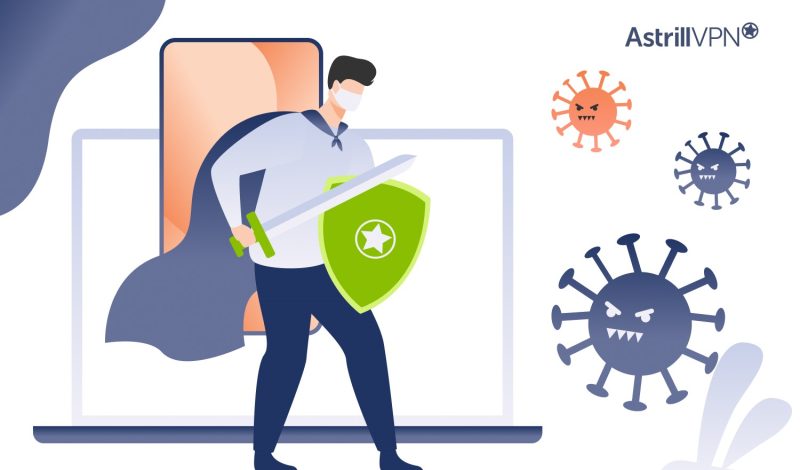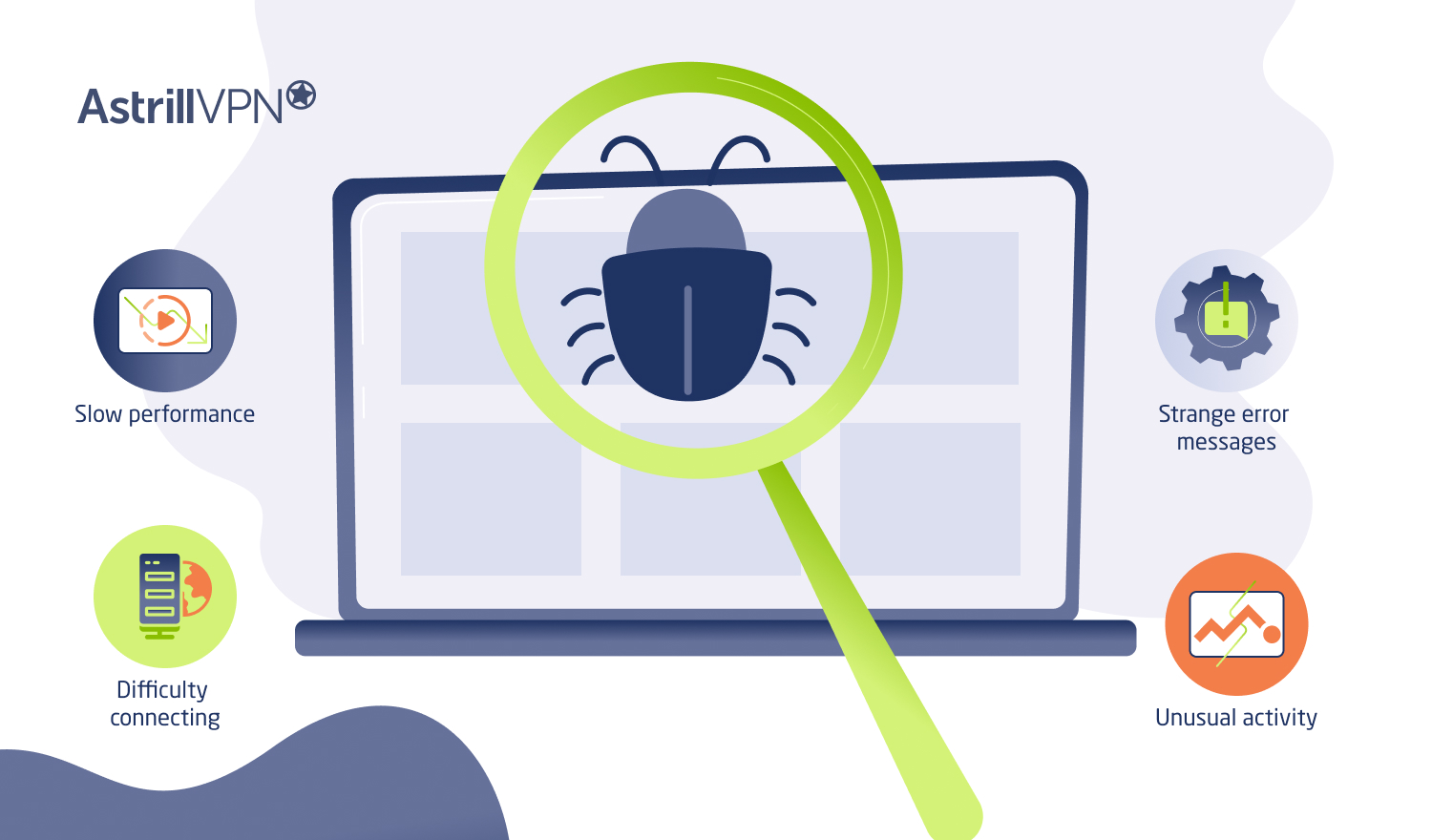Does a VPN Protect You From Viruses? Here’s What You Need to Know

Bisma Farrukh

If you’re surfing the web when suddenly everything slows to a crawl, and Pop-ups bombard your screen with scary warnings that your computer is infected. Well! Could a VPN have stopped this virus attack? We did the digging to find out what does a VPN protect you from. Get ready to separate fact from fiction on whether VPNs keep viruses at bay. We’ve uncovered key insights into the VPN-virus connection that could save your computer. Read on to get the inside scoop.
Table of Contents
Does VPN Protect from Viruses and Malware?
The short answer is no. A VPN only encrypts your connection and masks your location – it doesn’t scan for viruses or block malicious websites. To stay protected, you still need to take the usual precautions. Run antivirus software on all your devices, enable firewalls, use strong passwords, be wary of phishing emails, and avoid sketchy websites. A VPN adds an extra layer of security for your online activities, but it’s not a substitute for basic cyber hygiene.
Some VPN services do offer additional features like ad blocking, tracker blocking or malware protection. But at their core, VPNs are meant to protect your privacy and location – not directly guard against viruses. So keep your antivirus software up to date and stay vigilant when connected to public Wi-Fi. A VPN in combination with good digital safety habits is the best way to avoid cybercriminals and stay secure online.
How to know if your device is infected with a Virus?
If your device suddenly starts acting strangely, it could be a sign of a virus. Some common symptoms to watch out for include:

Slow performance
If your computer or phone is running much slower than usual, that could indicate a virus. Viruses run processes in the background that bog down your system. Try running an antivirus scan to check for any infections.
Strange error messages
Seeing unusual error messages pop up on your screen is another clue your device may have a virus. Viruses can disrupt normal operations and trigger weird errors or warnings.
Unusual activity
Notice new apps appearing that you didn’t download? Hear strange noises coming from your speakers? See the mouse pointer moving on its own? These types of unusual behaviors could point to a virus that has taken control of your system. Shut down your device and run a virus scan immediately.
Difficulty connecting
If you have trouble connecting to the internet or certain websites, a virus may have compromised your network settings or be blocking connections. Run an antivirus program to scan for and remove any infections.
When in doubt, it’s always a good idea to run a virus scan on your device. An up-to-date antivirus program should detect and remove any malware, adware or other viruses found on your system so you can get back to worry-free computing.
How AstrillVPN can help in protecting you from viruses?
AstrillVPN uses strong encryption and other security features that can help shield your device from malware and viruses.
Encrypted internet connection
When you connect to the internet through AstrillVPN, all your online activity is encrypted. This means hackers and snoopers can’t see what websites you visit or what data you send and receive. Without being able to monitor your activity, they have no way to inject viruses or install malware on your device.
No logging
AstrillVPN maintains a strict no-logging policy. They do not store any records of your internet usage or personal information. Since AstrillVPN doesn’t keep logs, your online activity can’t be traced back to you. This also means there is no data for hackers to access and use to target your device.
Kill switch
AstrillVPN includes an automatic kill switch. If your VPN connection drops for any reason, the kill switch will immediately terminate your internet connection. This prevents your real IP address and online activities from being exposed. The kill switch adds an extra layer of protection against viruses that may try to access your device when the VPN is down.
Using AstrillVPN along with standard security practices like updating your software and using antivirus tools, is one of the best ways to shield yourself from malicious viruses and other online threats. AstrillVPN helps create an encrypted tunnel for your internet traffic and hides your real IP address, making it very difficult for hackers and their viruses to find or target your device.
What Are Other Ways to Prevent Viruses from Infecting Your Devices?
A VPN alone cannot prevent viruses from infecting your devices. You need to take additional precautions to strengthen your security.
Update your software regularly
Keep your operating systems and software up-to-date with the latest patches. Updates often contain security fixes for vulnerabilities that could be exploited by viruses and malware. Enable automatic updates on your devices whenever possible.
Use reputable antivirus software
Install comprehensive antivirus software on all your devices and keep it up-to-date. Reputable antivirus software uses signatures and heuristics to detect and block known viruses, malware, and other threats. Perform regular scans of your system and connected storage drives.
Be wary of phishing emails
Phishing emails are a common infection vector for viruses and malware. Never click links or download attachments from unsolicited or suspicious emails. Legitimate companies will not ask for sensitive information like passwords or account numbers via email.
Practice safe browsing
Be cautious when visiting unknown websites or clicking links, especially those asking you to download software or update system files. Only download software from trusted sources. Enable popup blockers and ad blockers on your web browser.
Back up your data
Regularly back up your important files and data in case your devices do become infected. That way, even if a virus corrupts or deletes files, you’ll have copies to restore from. Store backups on external storage drives and consider using a cloud storage service for offsite backup.
Following these best practices can help prevent viruses and other malware from compromising your privacy, security, and data.
Ways You Can Still Get Viruses While Using a VPN
While a VPN can help boost your online security and privacy in many ways, it isn’t a magic bullet. There are still some ways you might get infected with viruses, malware and other cyber threats, even when connected to a VPN.
- If you download an infected file or visit an unsafe site, you could get a virus. VPNs protect your internet connection and hide your online activities, but they can’t scan files or websites for viruses and malware. It’s still important to be cautious of what you click and download. Using antivirus software and practicing safe browsing habits is key.
- You’re also still at risk if you use an unsecured Wi-Fi network. Public networks are prime targets for hackers trying to spread malware. Even with a VPN, they may be able to see your online activities and infect your device. For the best protection, avoid doing anything sensitive on public Wi-Fi.
- VPNs also won’t protect you from phishing emails, infected ads, or malicious social media scams. These cyber threats rely on tricking users into clicking links, downloading files or entering login credentials. While a VPN hides your location and internet traffic, it can’t stop you from falling for a well-crafted phishing scheme. Vigilance and security awareness are the best defenses.
VPN vs Antivirus Comparison
| Aspect | VPN | Antivirus Software |
| Purpose | Protect online privacy | Detect and remove malware |
| Function | Encrypts internet traffic | Scans and monitors files/system |
| Privacy | Hides IP address | Does not directly impact privacy |
| Security | Secures data transmission | Protects against malicious code |
| Internet Access | May slow down connection | No impact on intern |
| Usage Scenarios | Public Wi-Fi protection | Protection against viruses |
Statistics about Malware and Viruses
According to researchers, the number of malware and viruses targeting home networks and devices is expected to reach over 20 billion. This is mainly due to the increasing number of connected devices in homes with poor security.
- Over 560,000 new pieces of malware are detected daily, highlighting the constant threat they pose.
- There are currently over 1 billion malware programs in existence, emphasizing the scale of the issue.
- In the first half of 2022 alone, there were 236.7 million ransomware attacks globally, with an average cost of $4.54 million per incident.
- Employees with infected machines can inadvertently spread viruses more widely, contributing to the proliferation of malware.
FAQs
Yes, a VPN does not replace antivirus software. Antivirus scans for and removes actual malware on your device. A VPN only hides your internet traffic.
No, a VPN does not filter out phishing, spam or malicious websites. Be cautious of unsolicited links and emails, and only visit reputable websites.
Yes, like any software, VPNs can have vulnerabilities that are exploited. Choose a reputable AstrillVPN that keeps its software up to date with the latest patches and keep your device’s software up to date as well.
A VPN does not directly block viruses. Its primary function is to encrypt and secure your internet connection, providing privacy and anonymity. While a VPN can add a layer of security by encrypting your data and hiding your IP address, it is not specifically designed to detect or block viruses.
Conclusion
VPNs can protect you from viruses and malware to some extent by encrypting your traffic, hiding your IP address, and blocking access to malicious sites but they aren’t foolproof. You’ll still need comprehensive antivirus software and safe browsing habits for full protection. The best bet is to use your VPN along with updated antivirus software, avoid questionable sites and downloads, and keep all your software updated. With the right combo of tools and smart practices, you can browse the web safely with a VPN.


No comments were posted yet